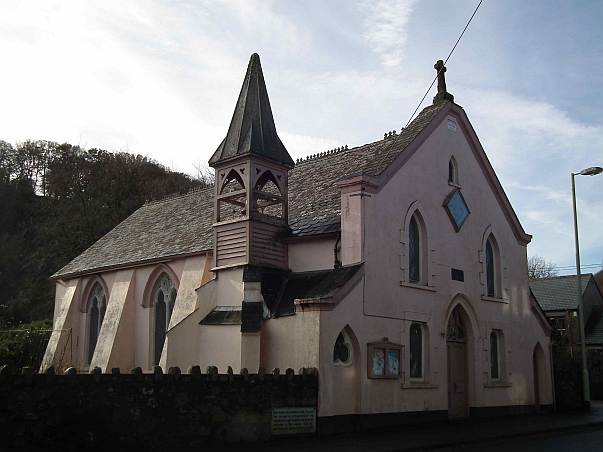Andrew Heard married Elizabeth Burrows in Colebrooke in 1814. They had eight children, all born in Bow. He worked in Bow tannery until his death in 1835.
Their fifth child, also called Elizabeth, was born in 1825. When she was ten, she was assigned as a parish apprentice to Edwin Partridge Longman, a saddler in Bow village, until she married or was 21. She had a son, William, born in 1845, and Edwin Longman, as putative father, was ordered to pay maintainance. However William died aged three.
In 1848, she was married in the Wesleyan (Methodist) Chapel in Sticklepath to John Austin. He was born in Sampford Courtenay and was two years younger than her.
At the time of their marriage he was an agricultural labourer in Taw Green, and she was a servant at The Barton near the church in Sampford Courtenay.

Sticklepath Methodist Church (built 1816)
They then moved to Combe-in-Teignhead where their first son, William, was born in 1850. John Austin worked as a farm labourer at Middle Rocombe Farm.
By 1861 he owned and farmed 43 acres at Parford near Moretonhampstead, and had five more children. Mary, their youngest daughter was born in 1863.
They decided to emigrate as a family to Australia. There was the attraction of the gift of 30 acres of land (value £30) for everyone paying their passage to Moreton Bay (Brisbane).
They embarked from Plymouth on 13 April 1866 in the sailing ship Netherby belonging to the Black Ball line. There were 452 emigrants and 52 crew on board under the command of Captain Owen Owens.
After rounding the Cape of Good Hope they ran into stormy weather and instead of taking a course south of Tasmania, they attempted to go through the Bass Strait.
On the night of 14 July, the Netherby ran aground on the west coast of King Island, uninhabited apart from lighthouse keepers.
Fortunately all the passengers and crew survived, but the ship broke up. They managed to live off salvaged food supplies, in tents made from sail canvas until they were rescued ten days later by a ship sent from Melbourne.
The Austins made it up to Brisbane, and set up a farm in the North Pine River area.
John was charged twice for possession of an illicit still. The first time in 1878 he was fined £100 with 4 months’ jail as an alternative. A year later he was caught again with vats containing 3-400 gallons of wash that he was distilling and supplying to a local pub. For this he was given a year's jail sentence. Around this time his house was repossessed.
Ironically at the time of the shipwreck, John Austin's father Josias was living in the Launceston area of Tasmania. In 1835 he had been covicted of stealing sheep near Bow and as a convict he had been transported to van Diemen's land (as it was then known), for life.
